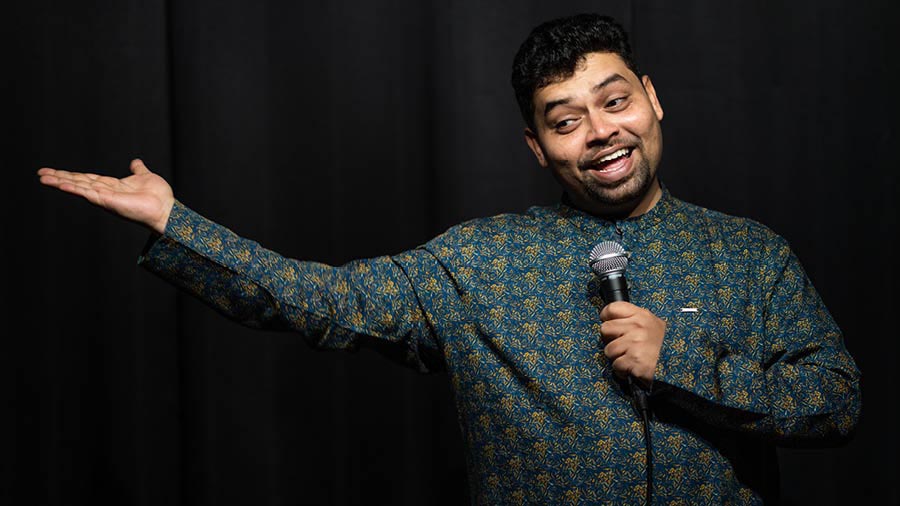Ankita Ghosh had a textbook life laid out in front of her. Do well in academics, get a PhD, choose a complex research topic, and settle down with a cushy job. But Ankita dropped out of a doctoral programme (from an IIT!), and decided to start writing.
A decade later, she creates Vietnamese advertisements by day, and tells English jokes by night. Her jokes have taken her to multiple countries, and she finally did her first show in Kolkata in November last year.
My Kolkata caught up with Ankita to talk about her interesting journey to finding comedy.
Looking for direction
Born in Kolkata, Ankita’s father wanted her to either become an engineer or a bureaucrat. “You know how Bengali dads are,” said the 44-year-old. After finishing school at Holy Child School on CIT Road, she did her Master’s at Rajabazar Science College and the arts became her outlet. She began writing about films and theatre for small magazines.
For her MSc project, Ankita developed a device to understand the ways in which children with Down Syndrome respond to signals. Her drive towards creating learning-based solutions for disabled children, and interest in design ergonomics, got her to the hallowed campus of IIT Bombay for a PhD programme. While she enjoyed her time at IIT, Ankita realised that science wasn’t her calling, and dropped out returning to Kolkata. “My father didn’t speak to me for six months. To be fair, this kept happening throughout our lives. We had a very strong love-hate relationship,” she chuckled, remembering her life-changing decision.
Free to choose her path for the first time, Ankita realised writing was her calling and eventually started working as a copywriter in 2001 in a job that “had very little money, but was enjoyable.” The first ad Ankita ever wrote was for Boroline!
Her life changed further when a friend asked if she was open to relocating, and offered a choice between Mumbai and Bangladesh. Always one to swim against the tide, you can guess the place that Ankita picked.
Two years with Leo Burnett in Dhaka, followed by three years at Ogilvy, Ankita enjoyed the “spirited work culture” but living in Bangladesh as a single woman was “stressful”, though her ancestral roots in Bangladesh made things easier, as did the common language. “Bangladesh and Bengal were similar in terms of warmth, adda and food. But I also saw a country coming into its own. There would be parties where women entered in burkas, and then changed into dresses. Joto repression, toto rebellion (more the repression, more the rebellion).”
Ankita’s next gig was with an agency in Vietnam’s Ho Chi Minh city in 2016, where she faced her newest challenge — language. Navigating the differences between Vietnamese and English taught her the importance of focusing on the essence of language rather than syntax. These lessons with language helped her when she entered more uncharted territory.
Discovering comedy
In 2019, one of her ex-colleagues, who was directing a stage production based on the 1911 novel Secret Garden, bumped into her in an elevator and asked, “Do you sing and dance?” to which Ankita promptly replied, “All Indians do that.” This chance encounter led to her first time on stage. One of the cast members was a budding stand-up comedian, and they became good friends. Back then, she had never considered telling jokes herself.
A month later, the friend was conducting a joke-writing workshop, and asked her to join. “He told me that all the participants would be showcasing their jokes, and encouraged me to go up on stage too. When I was apprehensive, he asked me to perceive it as an advertising pitch.” After much convincing, Ankita relented. Her first mic was “horrible”, and she remembers “shaking with anxiety”.
She continued doing irregular spots for six months, till she bombed at a Halloween show and considered quitting comedy for good. “The showrunners pushed me to perform the same set at another mic, two days later. I killed that day, and realised the importance of testing material and going up on stage regularly. In fact, I still use one of the jokes from my first mic today — something I am very proud of,” she said.
Finding a footing
Unfortunately, COVID-19 took to the world just as Ankita took to comedy. While most performers felt stagnant because of the lockdown, she experienced exponential growth. “I began doing a lot of Zoom shows, which allowed me to perform with comics from Japan, Malaysia, USA and UK. This opened new rooms around the world, and pushed my writing, because I was performing with comics who weren’t from Vietnam for the first time.” As soon as the lockdown lifted, she began making plans to perform with her friends from across borders.
In the last two years, Ankita has travelled exclusively for comedy, performing at venues in USA, UK, Dubai, Australia, Malaysia, Thailand, Vietnam. Travelling exploded her craft, making her push her limits. “I once agreed to split an hour at the Camden Fringe in London with a friend, even though I didn’t have 30 minutes of material. I wrote all of it after registering. I also booked the 11am slot for eight days at the Edinburgh Fringe, and that was a difficult room to crack because the only audiences I would get were either insomniacs or old people with sleeping problems. It was very humbling to see them give blank stares to my Tinder jokes,” she laughed, recollecting her travelling gigs.
While Ankita maintains that shows in the UK and Australia can have brutal heckling, seeing her jokes working across countries also gives a different level of validation. This is a huge leap for someone who once found it difficult to write jokes in English, because she thinks in Bengali. The tables were hilariously turned when she performed in Kolkata for the first time last month, and wondered if her Vietnam-centric jokes would work here. “I was surprised that we had sold out despite it colliding with the World Cup Final. The audience was incredible, and it was even more special as it coincided with my father’s third death anniversary. If he was alive, he would’ve made me sit at home and watch cricket the whole time.”
Bringing truth to humour
Ankita’s advertising background has perfectly complemented her comedy, and she feels that both spaces are similar at the core. “With both advertising and comedy, I used to write a lot more at the start. Then I started editing, because comedy and copywriting are all about getting to the punchline in as little words as possible.” She also plans to create two workshop modules next year which guide comedians on copywriting and presentation. “The basic principles are the same, where you’re selling stories to strangers, and they have to buy into you,” she explains
When it comes to her material, Ankita believes that honesty is the best policy. “I have always talked about things that have happened in my life, be it my family, or my dating experiences. This year, I stopped trying to write jokes. Instead, I now write things as they happen, and try to make them funny.” The realisation came to her after she spent three months trying to write jokes about a new guy she was dating, with little success. She then decided to “write what happened” and “every other line turned out to be funny.” For the longest time, Ankita found interactions with my mom stressful. Now, I find them to be a goldmine of material. “As comics, we sometimes forget that most stories aren’t inherently funny. We make them funny because of our funny takes.”
Around three years ago, Ankita also realised the potential of humour as dissent and using it to speak truth to power, and the catalyst was an event during her father’s passing. “A cousin I hadn’t seen in years, who molested me when I was young, came to the crematorium. When I told my mom to not come home for the rituals, she was more concerned about what people say.” Agitated by the incident, she wrote about it and told the story on stage in Edinburgh. “People laughed, but they came up to me after my performance, and appreciated my courage. Comedy helped me take the power back.”
While she has experienced some pushback, Ankita maintains that she won’t tweak her comedy just to make it more palatable to some people. Her unapologetic brand of comedy has lent her the name, ‘Dark and Dirty’, something that she bears with pride. “A showrunner in Ho Chi Minh City wrote an article on me, calling me the ‘Queen of D**k jokes’ in a derogatory manner. On his next show, I did a spot of 14 minutes, where I only told d**k jokes, winning over the audience. As a comic, I appreciate groans more than laughter.”


